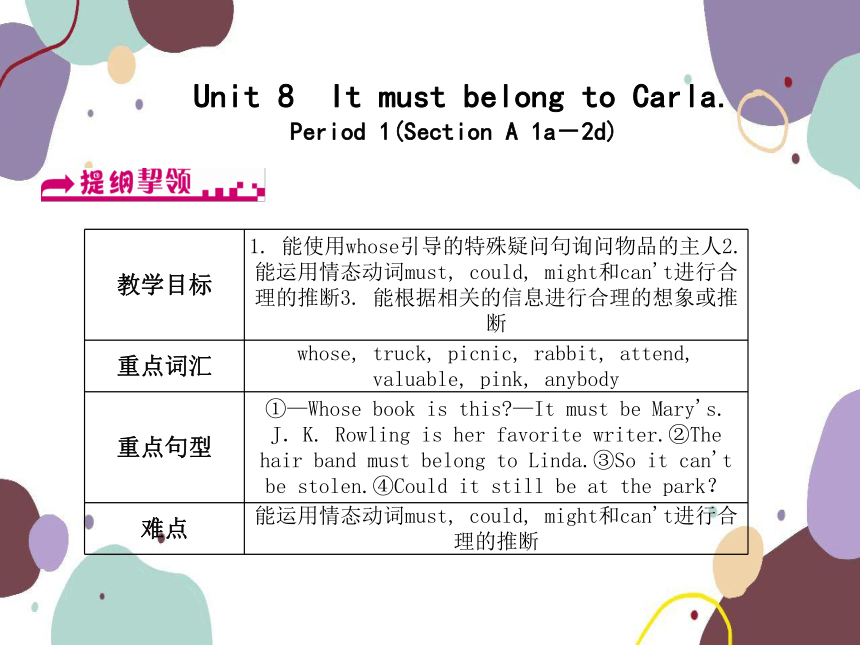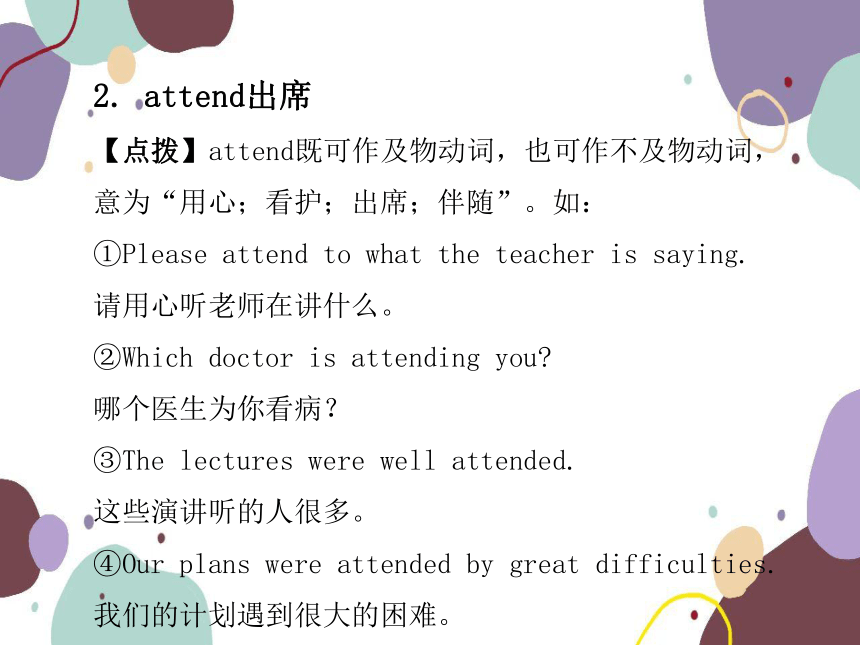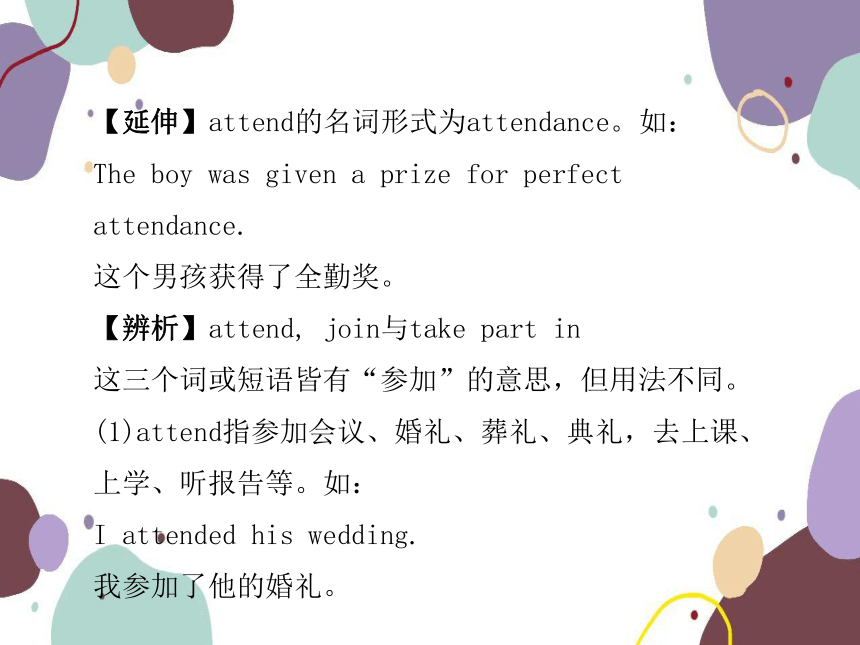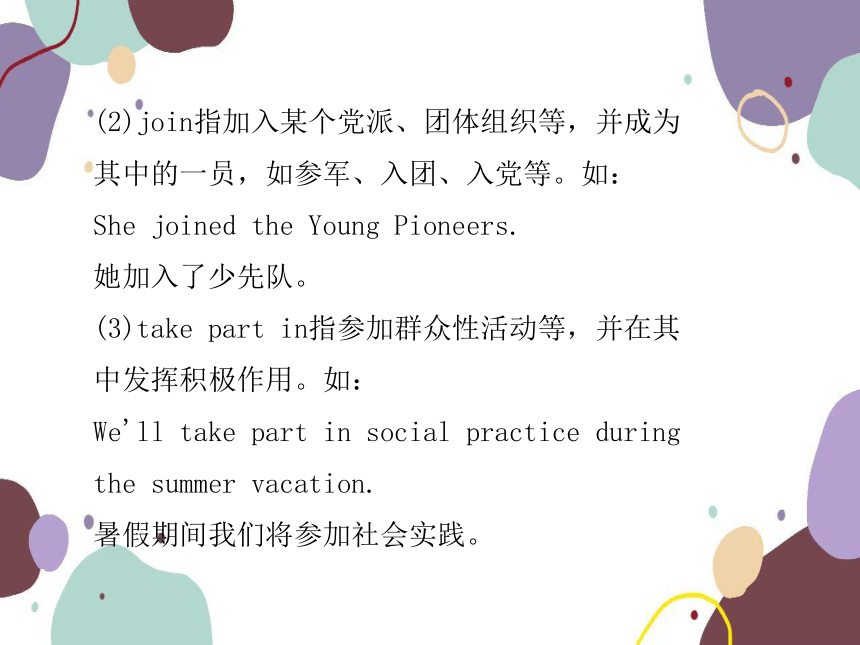人教版九年级全册 Unit 8 It must belong to Carla. Section A 1a-2d 课件 (共13张PPT)
文档属性
| 名称 | 人教版九年级全册 Unit 8 It must belong to Carla. Section A 1a-2d 课件 (共13张PPT) |  | |
| 格式 | pptx | ||
| 文件大小 | 220.6KB | ||
| 资源类型 | 教案 | ||
| 版本资源 | 人教新目标(Go for it)版 | ||
| 科目 | 英语 | ||
| 更新时间 | 2022-10-19 12:07:43 | ||
图片预览






文档简介
(共13张PPT)
Unit 8 It must belong to Carla.
Period 1(Section A 1a-2d)
教学目标 1. 能使用whose引导的特殊疑问句询问物品的主人2. 能运用情态动词must, could, might和can't进行合理的推断3. 能根据相关的信息进行合理的想象或推断
重点词汇 whose, truck, picnic, rabbit, attend, valuable, pink, anybody
重点句型 ①—Whose book is this —It must be Mary's. J.K. Rowling is her favorite writer.②The hair band must belong to Linda.③So it can't be stolen.④Could it still be at the park?
难点 能运用情态动词must, could, might和can't进行合理的推断
1. last 上次;最近的一次
【点拨】(1)last作副词时,意为“上次;最近的一次”,常用于句末或句中。如:
①When I last saw her, she was working in Shanghai.我上次见她时,她在上海工作。
②When did you see him last
你最近一次见到他是什么时候?
(2)last作动词时,意为“持续”。如:
The movie lasted for an hour.
电影持续了一个小时。
2. attend出席
【点拨】attend既可作及物动词,也可作不及物动词,意为“用心;看护;出席;伴随”。如:
①Please attend to what the teacher is saying.请用心听老师在讲什么。
②Which doctor is attending you
哪个医生为你看病?
③The lectures were well attended.
这些演讲听的人很多。
④Our plans were attended by great difficulties.我们的计划遇到很大的困难。
【延伸】attend的名词形式为attendance。如:
The boy was given a prize for perfect attendance.
这个男孩获得了全勤奖。
【辨析】attend, join与take part in
这三个词或短语皆有“参加”的意思,但用法不同。
(1)attend指参加会议、婚礼、葬礼、典礼,去上课、上学、听报告等。如:
I attended his wedding.
我参加了他的婚礼。
(2)join指加入某个党派、团体组织等,并成为其中的一员,如参军、入团、入党等。如:
She joined the Young Pioneers.
她加入了少先队。
(3)take part in指参加群众性活动等,并在其中发挥积极作用。如:
We'll take part in social practice during the summer vacation.
暑假期间我们将参加社会实践。
1. It must belong to Carla.
这一定属于卡拉。
【点拨】(1)belong to意为“属于”。如:
The car belongs to my uncle.
这辆小汽车属于我叔叔。
这句话还可以说成:
The car is my uncle's.
这辆小汽车是我叔叔的。
当表述某物属于某人时,注意这两句的不同。belong to后直接加人名或人称代词宾格,而第二句be动词后要用名词的所有格形式或名词性物主代词。如:
①The book belongs to me.
=The book is mine.
这本书是我的。
②The T-shirt belongs to Tom.
=The T-shirt is Tom's.
这件T恤是汤姆的。
③Does the rabbit belong to your sister
=Is the rabbit your sister's
这只兔子是你姐姐/妹妹的吗?
④Who does this coat belong to
=Whose coat is this 这件外衣是谁的?
(2)在该句中,must表示有把握的推断,意为“一定”。
【延伸】(1)表示“不可能”的推断用can't。如:
The shoes can't be Lucy's, because they are much too small for her.这双鞋不可能是露西的,因为对她来说它们实在太小了。
(2)表示可能性不大,可用might, may, could, can,其中can常用于疑问句。如:
①Where can he be
他会在哪儿呢?
②Sam could be very sad.
萨姆可能很伤心。
③She may know the answer, but I'm not sure.
她可能知道答案,但我不是很确定。
④He might come soon.
他可能很快就来了。
2. I'll call them now to check if anybody has it.
我现在就给他们打电话,看看是否有人捡到了它。
【点拨】(1)call sb.意为“给某人打电话”。如:
I will call you if I have time.
如果我有时间,我会给你打电话的。
【延伸】“给某人打电话”的常用短语: phone/telephone/ring sb., give sb. a call/ring, make a telephone call to sb., ring/call sb. up(注意: ring sb. up与call sb. up为“动词+副词”型短语,当宾语是代词时,代词要放在中间)。如:
Please call/ring me up when you get there.
你到达那里时,请给我打电话。
(2)to check在句中作目的状语。动词不定式在句中作目的状语时,既可放在句首,也可放在句末,意为“为了……”。如:
①I stayed there to see what would happen.
我待在那儿,看看会发生什么。
②To pass the English exam, I have to study English day and night.
为了通过英语考试,我不得不夜以继日地学习英语。
【延伸】常见的表目的的结构还有: in order to和so as to等。如:
①In order to do great things, we have to perfect the small things.
为了做大事,我们必须把小事做好。
②He ran fast so as to catch up with me.
他跑得飞快以便赶上我。
Unit 8 It must belong to Carla.
Period 1(Section A 1a-2d)
教学目标 1. 能使用whose引导的特殊疑问句询问物品的主人2. 能运用情态动词must, could, might和can't进行合理的推断3. 能根据相关的信息进行合理的想象或推断
重点词汇 whose, truck, picnic, rabbit, attend, valuable, pink, anybody
重点句型 ①—Whose book is this —It must be Mary's. J.K. Rowling is her favorite writer.②The hair band must belong to Linda.③So it can't be stolen.④Could it still be at the park?
难点 能运用情态动词must, could, might和can't进行合理的推断
1. last 上次;最近的一次
【点拨】(1)last作副词时,意为“上次;最近的一次”,常用于句末或句中。如:
①When I last saw her, she was working in Shanghai.我上次见她时,她在上海工作。
②When did you see him last
你最近一次见到他是什么时候?
(2)last作动词时,意为“持续”。如:
The movie lasted for an hour.
电影持续了一个小时。
2. attend出席
【点拨】attend既可作及物动词,也可作不及物动词,意为“用心;看护;出席;伴随”。如:
①Please attend to what the teacher is saying.请用心听老师在讲什么。
②Which doctor is attending you
哪个医生为你看病?
③The lectures were well attended.
这些演讲听的人很多。
④Our plans were attended by great difficulties.我们的计划遇到很大的困难。
【延伸】attend的名词形式为attendance。如:
The boy was given a prize for perfect attendance.
这个男孩获得了全勤奖。
【辨析】attend, join与take part in
这三个词或短语皆有“参加”的意思,但用法不同。
(1)attend指参加会议、婚礼、葬礼、典礼,去上课、上学、听报告等。如:
I attended his wedding.
我参加了他的婚礼。
(2)join指加入某个党派、团体组织等,并成为其中的一员,如参军、入团、入党等。如:
She joined the Young Pioneers.
她加入了少先队。
(3)take part in指参加群众性活动等,并在其中发挥积极作用。如:
We'll take part in social practice during the summer vacation.
暑假期间我们将参加社会实践。
1. It must belong to Carla.
这一定属于卡拉。
【点拨】(1)belong to意为“属于”。如:
The car belongs to my uncle.
这辆小汽车属于我叔叔。
这句话还可以说成:
The car is my uncle's.
这辆小汽车是我叔叔的。
当表述某物属于某人时,注意这两句的不同。belong to后直接加人名或人称代词宾格,而第二句be动词后要用名词的所有格形式或名词性物主代词。如:
①The book belongs to me.
=The book is mine.
这本书是我的。
②The T-shirt belongs to Tom.
=The T-shirt is Tom's.
这件T恤是汤姆的。
③Does the rabbit belong to your sister
=Is the rabbit your sister's
这只兔子是你姐姐/妹妹的吗?
④Who does this coat belong to
=Whose coat is this 这件外衣是谁的?
(2)在该句中,must表示有把握的推断,意为“一定”。
【延伸】(1)表示“不可能”的推断用can't。如:
The shoes can't be Lucy's, because they are much too small for her.这双鞋不可能是露西的,因为对她来说它们实在太小了。
(2)表示可能性不大,可用might, may, could, can,其中can常用于疑问句。如:
①Where can he be
他会在哪儿呢?
②Sam could be very sad.
萨姆可能很伤心。
③She may know the answer, but I'm not sure.
她可能知道答案,但我不是很确定。
④He might come soon.
他可能很快就来了。
2. I'll call them now to check if anybody has it.
我现在就给他们打电话,看看是否有人捡到了它。
【点拨】(1)call sb.意为“给某人打电话”。如:
I will call you if I have time.
如果我有时间,我会给你打电话的。
【延伸】“给某人打电话”的常用短语: phone/telephone/ring sb., give sb. a call/ring, make a telephone call to sb., ring/call sb. up(注意: ring sb. up与call sb. up为“动词+副词”型短语,当宾语是代词时,代词要放在中间)。如:
Please call/ring me up when you get there.
你到达那里时,请给我打电话。
(2)to check在句中作目的状语。动词不定式在句中作目的状语时,既可放在句首,也可放在句末,意为“为了……”。如:
①I stayed there to see what would happen.
我待在那儿,看看会发生什么。
②To pass the English exam, I have to study English day and night.
为了通过英语考试,我不得不夜以继日地学习英语。
【延伸】常见的表目的的结构还有: in order to和so as to等。如:
①In order to do great things, we have to perfect the small things.
为了做大事,我们必须把小事做好。
②He ran fast so as to catch up with me.
他跑得飞快以便赶上我。
同课章节目录
- Unit 1 How can we become good learners.
- Section A
- Section B
- Unit 2 I think that mooncakes are delicious!
- Section A
- Section B
- Unit 3 Could you please tell me where the restroom
- Section A
- Section B
- Unit 4 I used to be afraid of the dark.
- Section A
- Section B
- Unit 5 What are the shirts made of?
- Section A
- Section B
- Review of Units 1-5
- Unit 6 When was it invented?
- Section A
- Section B
- Unit 7 Teenagers should be allowed to choose their
- Section A
- Section B
- Unit 8 It must belong to Carla.
- Section A
- Section B
- Unit 9 I like music that I can dance to.
- Section A
- Section B
- Unit 10 You're supposed to shake hands.
- Section A
- Section B
- Review of Units 6-10
- Unit 11 Sad movies make me cry.
- Section A
- Section B
- Unit 12 Life is full of the unexpected
- Section A
- Section B
- Unit 13 We're trying to save the earth!
- Section A
- Section B
- Unit 14 I remember meeting all of you in Grade 7.
- Section A
- Section B
- Review of Units 11-14
